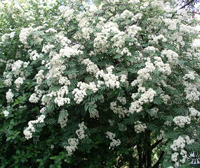The vast majority of readers of Tolkien’s work read the Lord of the Rings before the Silmarillion and other works about the Elder days. So the first encounter that most of us have with Fëanor are the brief mentions of him in LOTR. The first mention is at the gates of Moria:
Immediately, there is a suggestion of Fëanor as an object of reverence. There is a progression of increased spiritual standing in this statement, Gimli > Legolas > Gandalf is matched by Durin > the High Elves > the House of Fëanor. The suggestion is that Fëanor’s standing is above even that of the High Elves, an object of reverence to Gandalf himself. The really discriminating reader would also note that in the illustration of the doors of Moria, it states that the words are written in “Fëanorian characters” further emphasizing that suggestion.’There are the emblems of Durin!’ cried Gimli.
‘And there is the Tree of the High Elves!’ said Legolas.
‘And the Star of the House of Fëanor,’ said Gandalf.
This sense of Fëanor being an object of reverence is only increased when we next encounter Fëanor, after Pippin has looked in the Palantír and Gandalf has whisked him away and is musing about the Palantíri of old:
Then, when talking about the pull on him that the Palantír was exerting:The Palantíri come from beyond Westernesse, from Eldamar. The Noldor made them. Fëanor himself, maybe, wrought them, in days so long ago that the time cannot be measured in years.
Here we see Fëanor being described as being so skillful it is beyond the imagination of Gandalf the White, the highest being that we encounter in the Lord of the Rings. Quite a résumé!And how it does draw one to itself! Have I not felt it? Even now my heart desires to test my will upon it, to see if I could not wrench it from him and turn it where I would–to look across the wide seas of water and of time to Tirion the Fair, and perceive the unimaginable hand and mind of Fëanor at their work, while both the White Tree and the Golden were in flower!’
Finally, in the beginning of Appendix A, we get a little taste of the true story:
Here, some of Fëanor’s negative qualities (his pride and willfulness) and some of the bad results of his actions (the long defeat, as Galadriel puts it) are mentioned. But still, he is referred to as the greatest of the Elder in lore and arts (not, for instance, in strength and battle). There is still the suggestion of him as being a very high being.Fëanor was the greatest of the Eldar in arts and lore, but also the proudest and most self-willed. He wrought the Three Jewels, the Silmarilli, and filled them with the radiance of the Two Trees, Telperion and Laurelin, that gave light to the land of the Valar. The Jewels were coveted by Morgoth the Enemy, who stole them and after destroying the Trees, took them to Middle-earth, and guarded them in his great fortress of Thangorodrim. Against the will of the Valar Fëanor forsook the Blessed Realm and went in exile to Middle-earth, leading with him a great part of his people; for in his pride he purposed to recover the Jewels from Morgoth by force. Thereafter followed the hopeless war of the Eldar and the Edain against Thangorodrim, in which they were at last utterly defeated.
I had the impression before reading the Silmarillion that Fëanor was the main hero of the story. I was pretty surprised to learn how evil Fëanor’s actions were. I was even more surprised that he passed out of the story so soon after leading a great part of his people back to Middle-earth. Nonetheless, I think that his influence continues to be felt throughout the story (and even into the Lord of the Rings). So I think a discussion of his character and what it signifies would be a helpful thing.
Plus, Hobby has been asking for one.


